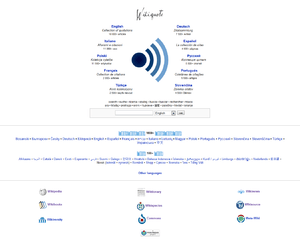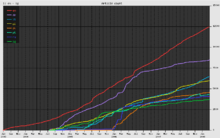Wikiquote
Wikiquote is one of a family of wiki-based projects run by the Wikimedia Foundation, running on MediaWiki software. Based on an idea by Daniel Alston and implemented by Brion Vibber, the goal of the project, which began as an outgrowth to Wikipedia Famous Quotations, is to produce collaboratively a vast reference of quotations from prominent people, books, films, proverbs, etc. and to be as proper as possible in regard to the details of the quotations and also providing the appropriate human reference of the quotation.
 Wikiquote logo | |
 Screenshot of the wikiquote.org home page | |
Type of site | Quotation repository |
|---|---|
| Available in | Multilingual |
| Owner | Wikimedia Foundation |
| Created by | Daniel Alston, Brion Vibber and the Wikimedia community |
| URL | www |
| Alexa rank | |
| Commercial | No |
| Registration | Optional |
| Launched | 10 July 2003 |
| Current status | active |
Though there are many online collections of quotations, Wikiquote is distinguished by being among the few that provide an opportunity for visitors to contribute[2] and the very few which strive to provide exact sources for each quotation as well as corrections of misattributed quotations. Wikiquote pages are cross-linked to articles about the notable personalities on Wikipedia.[3]
Initially, the project was created solely in English; a later expansion to include additional languages was started in July 2004.
History

The WikiQuote site originated in 2003.[4] The article creation milestones are taken from WikiStats.[5]
| Date | Event |
|---|---|
| Temporarily put on the Wolof language Wikipedia (wo.wikipedia.com). | |
| Own subdomain created (quote.wikipedia.org). | |
| Own domain created (wikiquote.org). | |
| New languages added. | |
| English edition reaches 2,000 pages. | |
| Reaches 24 languages. | |
| Reaches 10,000 pages in total. English edition has close to 3,000 pages. | |
| Reaches 34 languages, including one classical (Latin) and one artificial (Esperanto) | |
| English Wikiquote reaches 5,000 pages. | |
| French Wikiquote taken down for legal reasons. | |
| French Wikiquote restarted. | |
| English Wikiquote reaches 10,000 pages. | |
| Reaches 40 languages. | |
| Reaches a total of 100,000 articles among all languages. | |
| Enters the global Alexa top 2500 ranking.[6] | |
| Reaches a total of 200,000 articles among all languages. | |
| Introduced in the curriculum of national partnerships between schools and non-profits (Italy[7]) |
Multi-lingual cooperation
As of September 2016, there are a total of 89 language versions of Wikiquote[8] with 31 of those containing over 1,000 articles. Sixty of the 89 versions of Wikiquote have over 100 articles.[8] The ten largest Wikiquote language projects with over 5,000 articles each are listed here in descending order:
- English (31,000+ articles)[9]
- Italian
- Polish
- Russian
- Czech
- German
- Portuguese
- Persian
- Spanish
- Ukrainian
Use in experiments
It can be possible to utilise WikiQuote as a text corpus for language experiments.[10] The University of Wroclaw team entering Conversational Intelligence Challenge of the 2017 Conference on Neural Information Processing Systems (NIPS 2017) used WikiQuote to produce a conversational talker module for extraction of rare words.[11]
Reception
Wikiquote has been suggested as "a great starting point for a quotation search" with only quotes with sourced citations being available. It is also noted as a source from frequent misquotes and their possible origins.[12][13] It can be used for analysis to produce claims such as "Albert Einstein is probably the most quoted figure of our time".[14]
References
- "wikiquote.org Competitive Analysis, Marketing Mix and Traffic - Alexa". www.alexa.com. Retrieved 13 January 2020.
- DeVinney, Gemma (18 January 2007). "Wikiquote: Another source for quotes on the Web". UB Reporter. University of Buffalo. Archived from the original on 16 July 2012. Retrieved 29 November 2010.
- Ahsan, Hafsa (27 January 2007). "It's all about Wikis". DAWN. Archived from the original on 4 May 2012.
- Woods, Dan; Theony, Peter (February 2011). "3: The Thousand Problem-Solving Faces of Wikis". Wikis for Dummies. John Wiley & Sons. p. 58. ISBN 978-1-118-05066-8. OCLC 897595141. OL 5741003W.
- "Wikiquote Statistics - Article count (official)". Wikimedia. Archived from the original on 29 January 2018. Retrieved 28 January 2018.
- "Statistics Summary for wikiquote.org". Archived from the original on 29 October 2011. Retrieved 25 April 2009.
- "Protocollo MIUR-Wikimedia" (in Italian). Ministero dell'istruzione, dell'università e della ricerca. 26 January 2018. Archived from the original on 28 January 2018. Retrieved 28 January 2018.
- "Wikiquote Statistics". Wikipedia:Meta. Archived from the original on 1 July 2012. Retrieved 9 September 2016.
- "Statistics - Wikiquote". en.wikiquote.org. Archived from the original on 7 September 2018. Retrieved 20 April 2018.
- Buscaldi, D.; Rosso, P. (2007). Masulli F., Mitra S., Pasi G. (eds.). Some Experiments in Humour Recognition Using the Italian Wikiquote Collection. International Workshop on Fuzzy Logic and Applications. Lecture Notes in Computer Science. doi:10.1007/978-3-540-73400-0_58. ISBN 978-3-540-73399-7.CS1 maint: uses editors parameter (link)
- Chorowski, Jan; Łancucki, Adrian; Malik, Szymon; Pawlikowski, Maciej; Rychlikowski, Paweł; Zykowski, Paweł (21 May 2018). A Talker Ensemble: the University of Wrocław’s Entry to the NIPS 2017 Conversational Intelligence Challenge (Report). arXiv:1805.08032v1.
- Rickson, Sharon (22 November 2013). "How to Research a Quotation". New York Public Library. On the Web. Archived from the original on 18 October 2018. Retrieved 10 December 2019.
- Rentoul, John (11 May 2013). "The top ten:Misquotations". The Independent. Independent Digital News & Media Ltd. Archived from the original on 11 December 2019. Retrieved 13 December 2019.
- Robinson, Andrew (4 December 2019). "5 things you (probably) didn't know about Albert Einstein". History extra - BBC. Albert Einstein is probably the most quoted figure of our time. Archived from the original on 5 December 2019. Retrieved 12 December 2019.
External links
| Wikimedia Commons has media related to Wikiquote. |
| Wikiquote has quotations related to: Wikiquote |